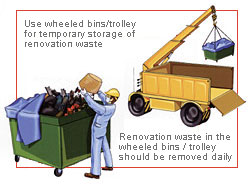|
Waste & Water
|
||||||||||||||||||||||||||||||||
|---|---|---|---|---|---|---|---|---|---|---|---|---|---|---|---|---|---|---|---|---|---|---|---|---|---|---|---|---|---|---|---|---|
|
| ||||||||||||||||||||||||||||||||
| Activities | ||||||||||||||||||||||||||||||||
| Problem |
-
|
|||||||||||||||||||||||||||||||
| Relevant Env. Control | Under the Waste Disposal Ordinance, Cap. 354, it is prohibited to dump waste in public places or on Government land, or on private premises without the consent of the owner or occupier. | |||||||||||||||||||||||||||||||
| Practical Solutions |
|
|||||||||||||||||||||||||||||||
| Activities | ||||||||||||||||||||||||||||||||
| Problem |
-
|
|||||||||||||||||||||||||||||||
| Relevant Env. Control | Identified as chemical wastes which are under the control of the Waste Disposal Ordinance, Cap. 354. Discharge of these chemical wastes into storm or foul drain is an offence under the Water Pollution Control Ordinance, Cap 358. They should be reused as far as possible. Otherwise, the contractor should register as Chemical Waste Producer and employ licensed Chemical Waste Collector to arrange for proper disposal. | |||||||||||||||||||||||||||||||
| Practical Solutions |
|
|||||||||||||||||||||||||||||||

